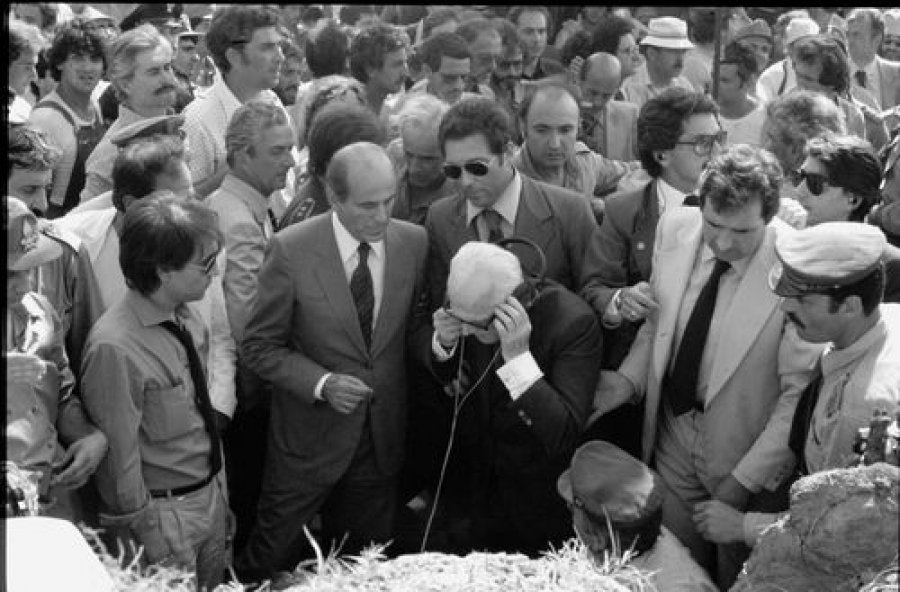Vermicino 1981, Alfredino Rampi e gli sciacalli
Il 10 giugno di quarant'anni fa l'inizio di una tragedia che come impatto mediatico non avrebbe avuto eguali...
8 Giugno 2021
di Stefano Olivari

Si avvicina il quarantennale della tragedia di Vermicino, visto che il piccolo Alfredo, per tutta Italia Alfredino, Rampi la sera del 10 giugno 1981 a Frascati, nei pressi nella via di Vermicino, cadde in un pozzo da cui non sarebbe uscito vivo. Nonostante la mobilitazione di tutta Italia, a partire da Pertini, o forse proprio a causa di questa mobilitazione, per tre giorni non si riuscì a trovare una soluzione per tirare fuori il bambino, aveva 6 anni, da 36 metri di profondità: questa la stima iniziale, anche se presto scivolò a 60 e poi a 71. Ed anzi gli errori commessi in quella fase furono decisivi nel decretare la morte di Alfredino.
Per tre giorni l’Italia rimase incollata di fronte al televisore, assistendo ad una sfilata incredibile di tecnici preparati, di millantatori, di speleologi coraggiosi, di politici locali indecenti, di opinionisti, pozzaroli, nani da circo (davvero) e addirittura una serie di persone senza arte né parte che avevano l’unico requisito della magrezza, fondamentale per infilarsi in quel buco. Non esisteva ancora la Protezione Civile come la intendiamo oggi, del resto, con tutti i problemi di coordinamento del caso. Straziante l’episodio di Angelo Licheri, che quasi riuscì ad imbragare Alfredino, ma non vorremmo ricordare tutti gli orrendi particolari.
Il più orrendo fu che la sera del 13 giugno guardammo su Rai Due l’andata della finale di Coppa Italia fra la Roma di Liedholm e il Torino di Cazzaniga, che da qualche mese aveva sostituito Rabitti: ci ricordiamo quella partita come una liberazione dopo tre giorni di angoscia e ancora ce ne vergognamo. Certo la vita è continuata anche dopo le guerre mondiali, ma ce ne vergognamo lo stesso. E per questo non abbiamo avuto il fegato di pubblicare la foto sorridente del bambino, quella che anche i più giovani conoscono.
L’agonia e la morte di Alfredo Rampi ci vengono in mente ancora oggi: si usa affermare che in quel momento iniziò la televisione del dolore ed in generale sbarcò in Italia la tivù spazzatura, ma bisogna dire che nei decenni successivi non saremmo mai arrivati a simili atrocità. Magari sarebbe accaduto di peggio, ma senza telecamere. Spesso si incolpa della diretta non stop, ben oltre la doverosa informazione, Emilio Fede, allora direttore del Tg1, ma Fede ha sempre scaricato la colpa su Antonio Maccanico, segretario generale del Quirinale, che voleva dare la massima evidenza allo show di Pertini. La Rai era sì in diretta da Vermicino, diretta quasi tutta gestita da Piero Badaloni, ma il super-mediatico presidente della Repubblica voleva essere lì nel momento in cui Alfredino sarebbe stato tirato fuori e quindi la diretta si allungò fino a diventare una non stop, in certe ore a reti unificate.
Una pagina poco gloriosa per Pertini, che pure di gloriose ne aveva avute, e per la Rai. Che riuscì a fare di peggio a mente fredda, a metà degli anni Novanta, quando fece uscire nella collana di videocassette VHS Grandi Emozioni Tv le registrazioni dei lamenti di Alfredo in fondo al pozzo, prima che la porcheria fosse ritirata dal mercato su ricorso della famiglia Rampi. A ulteriore riprova della non esistenza di un dio buono, anche il fratello minore di Alfredino, Riccardo, sarebbe morto giovane, a 36 anni di infarto, lasciando due bambine piccole. Chissà cosa pensa la famiglia Rampi dell’imminente fiction Sky su Alfredino, il 21 e il 28 giugno… E quindi? Le tante analisi massmediologiche su Vermicino sono senza senso: con tutte le critiche che si possono muovere alla televisione di oggi, dal 1981 non abbiamo mai visto niente di peggio.
The fortieth anniversary of the Vermicino tragedy is approaching, since little Alfredo, Alfredino Rampi for the whole of Italy, fell into a well on the evening of 10 June 1981 in Frascati, near Vermicino Street, from which he would not come out alive. Despite the mobilisation of the whole of Italy, starting with Pertini, or perhaps precisely because of this mobilisation, for three days no solution could be found to pull the child, who was six years old, out of a depth of 36 metres: this was the initial estimate, although it soon dropped to 60 and then 71. Indeed, the mistakes made at that stage were decisive in determining Alfredino’s death.
For three days Italy was glued to the television, watching an incredible parade of trained technicians, braggarts, courageous speleologists, indecent local politicians, opinion makers, pozzaroli, circus dwarfs (really) and even a series of people with no art or part who had the only requisite of being thin, which was essential to get into that hole. The Protezione Civile (Civil Defence) as we know it today did not yet exist, with all its coordination problems. The episode of Angelo Licheri, who almost managed to harness Alfredino, is heartbreaking, but we don’t want to recall all the horrific details.
The most horrendous was that on the evening of 13 June we watched on Rai Due the first leg of the Coppa Italia final between Liedholm’s Roma and Cazzaniga’s Torino, who had replaced Rabitti a few months earlier: we remember that match as a liberation after three days of anguish and we are still ashamed of it. Of course life continued after the world wars, but we are still ashamed of it. And that is why we did not have the guts to publish the smiling photo of the child, the one that even the youngest people know.
The agony and death of Alfredo Rampi still come to mind today: we use to say that in that moment the television of pain began and in general the trash TV landed in Italy, but it must be said that in the following decades we would never have arrived at similar atrocities. Perhaps worse things would have happened, but without cameras. Emilio Fede, then director of Tg1, is often blamed for the non-stop live broadcast, far beyond the required information, but Fede has always blamed Antonio Maccanico, secretary general of the Quirinale, who wanted to give maximum evidence to Pertini’s show. The RAI was live from Vermicino, almost all of it managed by Piero Badaloni, but the super-media president of the Republic wanted to be there at the moment when Alfredino would be pulled out and so the live broadcast was extended to become a non-stop broadcast, at certain times on the unified networks.
An unglorious page for Pertini, who had had some glorious ones, and for Rai. The Rai managed to do worse in the mid-nineties, when it released the recordings of Alfredo’s lamentations at the bottom of the well in the VHS video cassette series Grandi Emozioni Tv, before the rubbish was withdrawn from the market at the request of the Rampi family. As further proof of the non-existence of a good God, Alfredino’s younger brother Riccardo also died of a heart attack at the age of 36, leaving behind two small girls. Who knows what the Rampi family thinks of the forthcoming Sky fiction about Alfredino, on 21 and 28 June… So what? The many media analyses of Vermicino are meaningless: with all the criticisms that can be made of today’s television, we have never seen anything worse since 1981.





Commenti Recenti